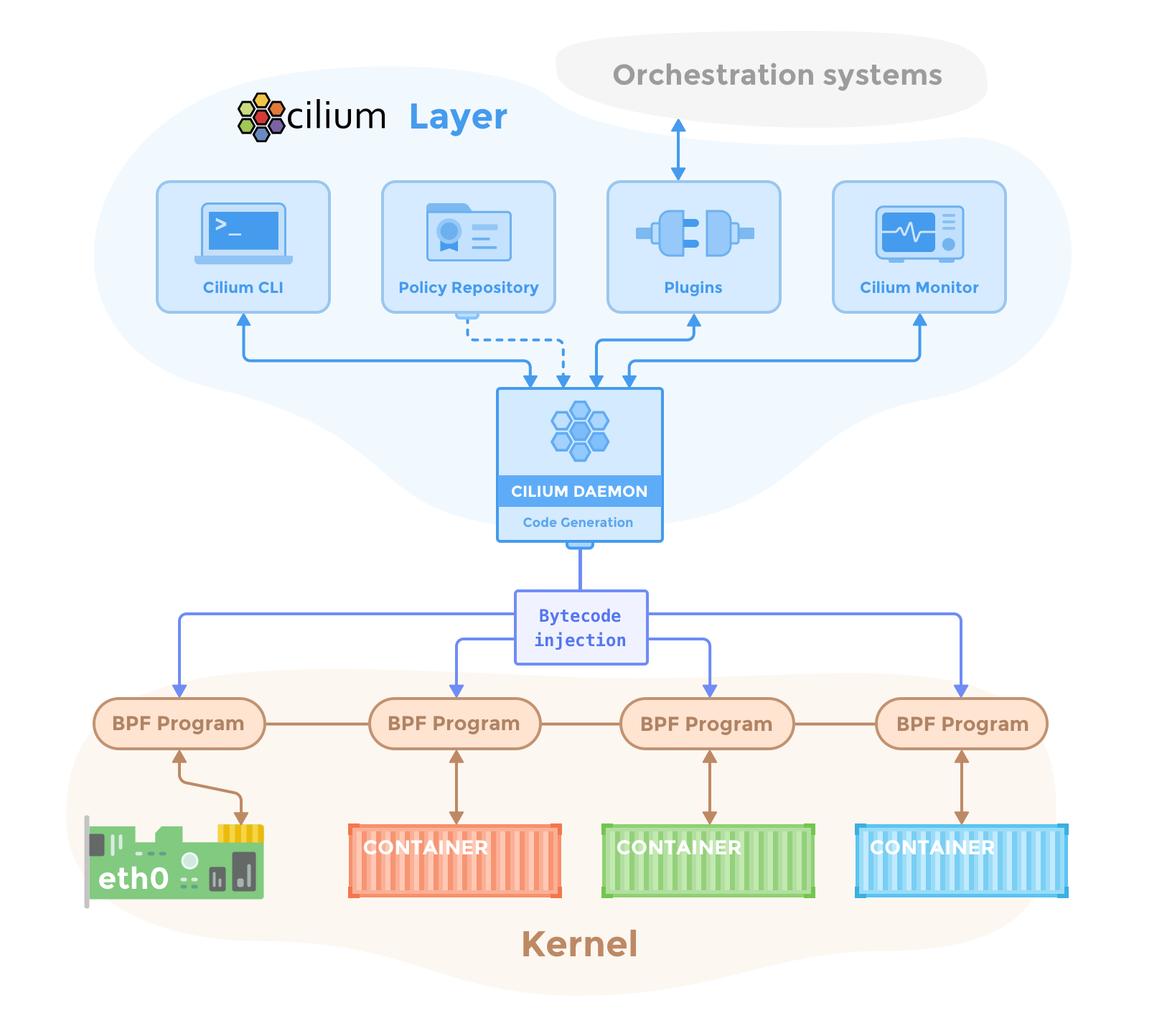Component Overview

A deployment of Cilium and Hubble consists of the following components running in a cluster:
Cilium
- Agent
The Cilium agent (
cilium-agent) runs on each node in the cluster. At a high-level, the agent accepts configuration via Kubernetes or APIs that describes networking, service load-balancing, network policies, and visibility & monitoring requirements.The Cilium agent listens for events from orchestration systems such as Kubernetes to learn when containers or workloads are started and stopped. It manages the eBPF programs which the Linux kernel uses to control all network access in / out of those containers.
- Client (CLI)
The Cilium CLI client (
cilium) is a command-line tool that is installed along with the Cilium agent. It interacts with the REST API of the Cilium agent running on the same node. The CLI allows inspecting the state and status of the local agent. It also provides tooling to directly access the eBPF maps to validate their state.Note
The in-agent Cilium CLI client described here should not be confused with the command line tool for quick-installing, managing and troubleshooting Cilium on Kubernetes clusters, which also has the name
cilium. That tool is typically installed remote from the cluster, and useskubeconfiginformation to access Cilium running on the cluster via the Kubernetes API.- Operator
The Cilium Operator is responsible for managing duties in the cluster which should logically be handled once for the entire cluster, rather than once for each node in the cluster. The Cilium operator is not in the critical path for any forwarding or network policy decision. A cluster will generally continue to function if the operator is temporarily unavailable. However, depending on the configuration, failure in availability of the operator can lead to:
Delays in IP Address Management (IPAM) and thus delay in scheduling of new workloads if the operator is required to allocate new IP addresses
Failure to update the kvstore heartbeat key which will lead agents to declare kvstore unhealthiness and restart.
- CNI Plugin
The CNI plugin (
cilium-cni) is invoked by Kubernetes when a pod is scheduled or terminated on a node. It interacts with the Cilium API of the node to trigger the necessary datapath configuration to provide networking, load-balancing and network policies for the pod.
Hubble
- Server
The Hubble server runs on each node and retrieves the eBPF-based visibility from Cilium. It is embedded into the Cilium agent in order to achieve high performance and low-overhead. It offers a gRPC service to retrieve flows and Prometheus metrics.
- Relay
Relay (
hubble-relay) is a standalone component which is aware of all running Hubble servers and offers cluster-wide visibility by connecting to their respective gRPC APIs and providing an API that represents all servers in the cluster.- Client (CLI)
The Hubble CLI (
hubble) is a command-line tool able to connect to either the gRPC API ofhubble-relayor the local server to retrieve flow events.- Graphical UI (GUI)
The graphical user interface (
hubble-ui) utilizes relay-based visibility to provide a graphical service dependency and connectivity map.
eBPF
eBPF is a Linux kernel bytecode interpreter originally introduced to filter network packets, e.g. tcpdump and socket filters. It has since been extended with additional data structures such as hashtable and arrays as well as additional actions to support packet mangling, forwarding, encapsulation, etc. An in-kernel verifier ensures that eBPF programs are safe to run and a JIT compiler converts the bytecode to CPU architecture specific instructions for native execution efficiency. eBPF programs can be run at various hooking points in the kernel such as for incoming and outgoing packets.
Cilium is capable of probing the Linux kernel for available features and will automatically make use of more recent features as they are detected.
For more detail on kernel versions, see: Linux Kernel.
Data Store
Cilium requires a data store to propagate state between agents. It supports the following data stores:
- Kubernetes CRDs (Default)
The default choice to store any data and propagate state is to use Kubernetes custom resource definitions (CRDs). CRDs are offered by Kubernetes for cluster components to represent configurations and state via Kubernetes resources.
- Key-Value Store
All requirements for state storage and propagation can be met with Kubernetes CRDs as configured in the default configuration of Cilium. A key-value store can optionally be used as an optimization to improve the scalability of a cluster as change notifications and storage requirements are more efficient with direct key-value store usage.
The currently supported key-value stores are:
Note
It is possible to leverage the etcd cluster of Kubernetes directly or to maintain a dedicated etcd cluster.